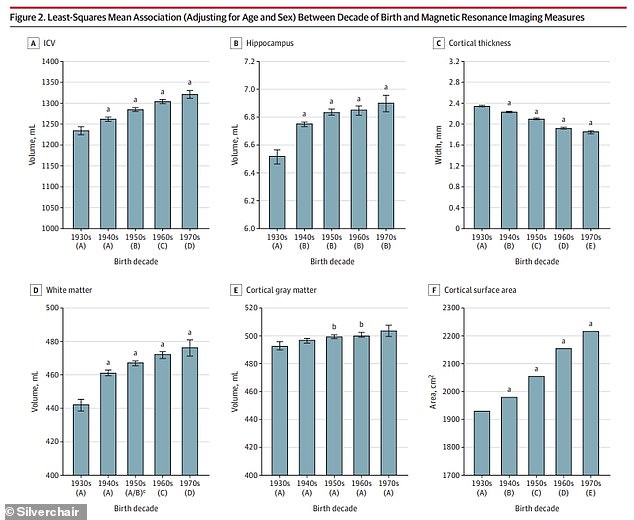Scientists discover that the human brain has grown by a whopping 7% since 1930… but there are signs that IQ has declined in recent years
Gen Z and Alpha may have bigger brains than people born 100 years ago, yet studies have shown they also have the lowest IQs of previous generations.
Researchers from the University of California (UC) Davis Health studied different brain sizes of people born between 1930 and 1970, and found a 6.6 percent increase in the brains among Generation X compared to the Silent Generation.
The team theorized that growth could be caused by external influences such as health, social, cultural and educational externalities and could reduce the risk of age-related dementia.
It comes as more recent studies have shown that the IQ scores of even younger generations have fallen in recent decades, which researchers have linked to an over-reliance on phones and the internet.
MRIs performed over the past 100 years have shown that brain size has increased by 6.6 percent and could reduce the risk of developing Alzheimer’s disease for younger generations

The volume of people’s brains has steadily increased since the 1930s, but reports show this has no impact on people’s intelligence levels
Brain size does not necessarily make people more intelligent, and research has suggested that there is only a small link between the two.
Neuroscientists have discovered that extra brain mass actually does very little when it comes to intelligence, and instead allows people to store more lifelong memories. Psychology today.
However, the latest findings may help put younger generations at a lower risk of developing dementia or Alzheimer’s disease.
The new research was conducted over a period of 75 years and found that the brains of people in the 1970s consistently grew by 6.6 percent, compared to those born in the 1930s.
The brain of the current generation has a volume of about 1,400 milliliters, but the average brain volume of people born in the 1930s was 1,234 milliliters.
The researchers reported that factors such as better educational performance and better management of medical problems could explain why people’s brains have grown in recent decades.
“The decade in which a person is born appears to influence brain size and possibly long-term outcomes,” said Charles DeCarli, first author of the study and professor of neurology at the UC Davis Alzheimer’s Disease Research Center.
Researchers looked at patterns of heart and other diseases in people born in the 1930s and introduced MRI (brain magnetic resonance imaging) testing of people in the second and third generations of the original 5,200 participants.
The MRIs were performed between 1999 and 2019 on people born in the 1930s through the 1970s, consisting of more than 3,000 participants with an average age of 57 years old.

People aged 18 to 22 saw the biggest decline in IQ tests between 2006 and 2018
The area of the brain that grew the most was the cortical surface that controls motor activities and sensory information.
They reported that the area had increased in volume by 15 percent and that the part of the brain involved in learning and memory, called the hippocampus, had also increased in size.
However, according to a separate study, the number of people affected by Alzheimer’s disease has declined by 20 percent since the 1970s, and researchers now say that increased brain size may be the culprit.
“Larger brain structures like those observed in our study may reflect improved brain development and improved brain health,” DeCarli said.
‘A larger brain structure represents a greater brain reserve and can buffer the later effects of age-related brain diseases such as Alzheimer’s disease and related dementias.’
Brain growth in younger generations could increase brain connectivity, the study said, leading to more accurate and efficient performance of tasks.
But even as researchers report that brains grow with each generation, the IQs of Generation Z and Alpha have dropped by at least two points, according to studies in Finland, France, Britain and other countries.
a 2023 study reported that IQ scores in the US have also fallen, but did not specify the exact decline, adding that the drop could be due to disruptions to in-person learning during the Covid-19 pandemic.
The researchers also said that the increase in social media use could be to blame, as skills such as verbal reasoning, visual problem solving and numerical sequence tests have all declined.
Academic and scientific presenter Professor Jim Al-Khalili told Dailymail.com earlier in 2022 that despite our ‘vastly increased scientific knowledge… the human brain has not become bigger, more efficient or better than it was thousands of years ago.’
This is in stark contrast to the latest findings that the human brain is getting bigger, but also raises the question of how cognitive development is increasing as Generation Z and Alpha struggle to meet the same IQ levels as previous generations.
